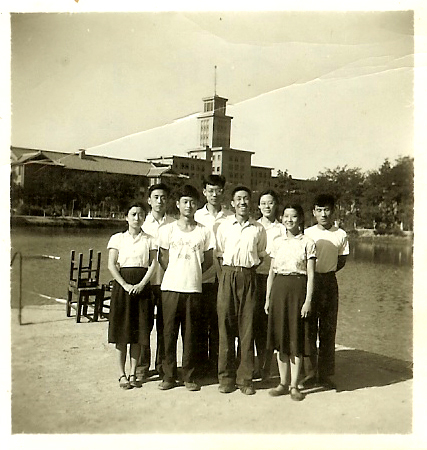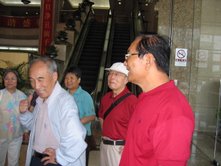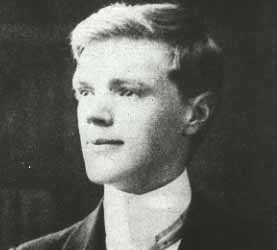|
王陞印
王陞印,北京通州人。 我班的生活委员,为大家服务任劳任怨。 我们正赶上“三年困难时期”的后一半,那时“生活”是件大事。毕业后分配到北京语言大学任教授。
  

后排右起第一人为王陞印 1965

前排左一为王陞印 2008,北京
  
|
English novelist & Poet D. H. Lawrence (1885-1930) |

D. H. Lawrence in 1906
(This image is in the public domain.)
David Herbert Richards Lawrence (1885–1930) was an English author, poet, playwright, essayist and literary critic. His collected works represent an extended reflection upon the dehumanising effects of modernity and industrialisation. In them, Lawrence confronts issues relating to emotional health and vitality, spontaneity, human sexuality and instinct.
Lawrence's opinions earned him many enemies and he endured official persecution, censorship, and misrepresentation of his creative work throughout the second half of his life, much of which he spent in a voluntary exile he called his "savage pilgrimage." At the time of his death, his public reputation was that of a pornographer who had wasted his considerable talents. E. M. Forster, in an obituary notice, challenged this widely held view, describing him as, "The greatest imaginative novelist of our generation." Later, the influential Cambridge critic F. R. Leavis championed both his artistic integrity and his moral seriousness, placing much of Lawrence's fiction within the canonical "great tradition" of the English novel. Lawrence is now generally valued as a visionary thinker and significant representative of modernism in English literature, although some feminists object to the attitudes toward women and sexuality found in his works.
The fourth child of Arthur John Lawrence, a barely literate miner, and Lydia (née Beardsall), a former schoolmistress, Lawrence spent his formative years in the coal mining town of Eastwood, Nottinghamshire. His birthplace, in Eastwood, 8a Victoria Street, is now a museum. His working class background and the tensions between his parents provided the raw material for a number of his early works. Lawrence would return to this locality, which he was to call "the country of my heart," as a setting for much of his fiction.
In late February 1922 the Lawrences left Europe behind with the intention of migrating to the United States. They sailed in an easterly direction, first to Ceylon and then on to Australia. A short residence in Darlington, Western Australia, which included an encounter with local writer Mollie Skinner, was followed by a brief stop in the small coastal town of Thirroul, New South Wales, during which Lawrence completed Kangaroo, a novel about local fringe politics that also revealed a lot about his wartime experiences in Cornwall.
The Lawrences finally arrived in the U.S. in September 1922. Here they encountered Mabel Dodge Luhan, a prominent socialite, and considered establishing a utopian community on what was then known as the 160-acre (0.65 km2) Kiowa Ranch near Taos, New Mexico. They acquired the property, now called the D. H. Lawrence Ranch, in 1924 in exchange for the manuscript of Sons and Lovers. He stayed in New Mexico for two years, with extended visits to Lake Chapala and Oaxaca in Mexico. While Lawrence was in New Mexico, he was visited by Aldous Huxley. After Lawrence's death, Frieda married Angelo Ravagli. Lawrence's ashes are at a shrine at the ranch, where Frieda and her husband spend their latter years.
While in the U.S., Lawrence rewrote and published Studies in Classic American Literature, a set of critical essays begun in 1917, and later described by Edmund Wilson as "one of the few first-rate books that have ever been written on the subject." These interpretations, with their insights into symbolism, New England Transcendentalism and the puritan sensibility, were a significant factor in the revival of the reputation of Herman Melville during the early 1920s. In addition, Lawrence completed a number of new fictional works, including The Boy in the Bush, The Plumed Serpent, St Mawr, The Woman who Rode Away, The Princess and assorted short stories. He also found time to produce some more travel writing, such as the collection of linked excursions that became Mornings in Mexico.
 
A Love Song
by D. H. Lawrence |
|
Reject me not if I should say to you
I do forget the sounding of your voice,
I do forget your eyes that searching through
The mists perceive our marriage, and rejoice.
Yet, when the apple-blossom opens wide
Under the pallid moonlight’s fingering,
I see your blanched face at my breast, and hide
My eyes from diligent work, malingering.
Ah, then, upon my bedroom I do draw
The blind to hide the garden, where the moon
Enjoys the open blossoms as they straw
Their beauty for his taking, boon for boon.
And I do lift my aching arms to you,
And I do lift my anguished, avid breast,
And I do weep for very pain of you,
And fling myself at the doors of sleep, for rest.
And I do toss through the troubled night for you,
Dreaming your yielded mouth is given to mine,
Feeling your strong breast carry me on into
The peace where sleep is stronger even than wine.
|
|
Beautiful Old Age
by D. H. Lawrence |
|
It ought to be lovely to be old
to be full of the peace that comes of experience
and wrinkled ripe fulfilment.
The wrinkled smile of completeness that follows a life
lived undaunted and unsoured with accepted lies
they would ripen like apples, and be scented like pippins
in their old age.
Soothing, old people should be, like apples
when one is tired of love.
Fragrant like yellowing leaves, and dim with the soft
stillness and satisfaction of autumn.
And a girl should say:
It must be wonderful to live and grow old.
Look at my mother, how rich and still she is! -
And a young man should think: By Jove
my father has faced all weathers, but it's been a life!
|
|
|
Forever nameless
Forever unknwon
Forever unconceived
Forever unrepresented
yet forever felt in the soul. |
|
Lies About Love
by D.H. Lawrence |
|
We are a liars, because
the truth of yesterday becomes a lie tomorrow,
whereas letters are fixed,
and we live by the letter of truth.
The love I feel for my friend, this year,
is different from the love I felt last year.
If it were not so, it would be a lie.
Yet we reiterate love! love! love!
as if it were a coin with a fixed value
instead of a flower that dies, and opens a different bud. |
|
If You are a Man
by D.H. Lawrence |
|
If you are a man, and believe in the destiny of mankind
then say to yourself: we will cease to care
about property and money and mechanical devices,
and open our consciousness to the deep, mysterious life
that we are now cut off from.
The machine shall be abolished from the earth again;
it is a mistake that mankind has made;
money shall cease to be, and property shall cease to perplex
and we will find the way to immediate contact with life
and with one another.
To know the moon as we have never known
yet she is knowable.
To know a man as we have never known
a man, as never yet a man was knowable, yet still shall be.
|
|
 
|
|

